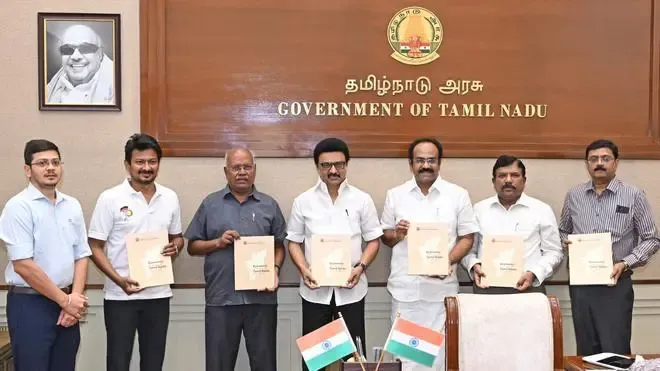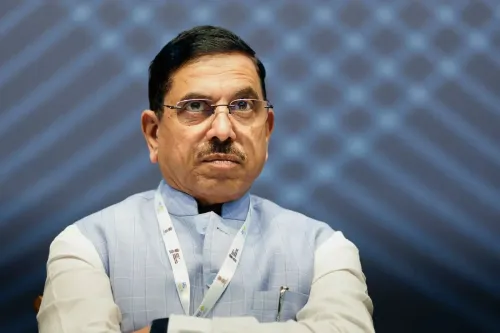Tamil Nadu Poised for Growth Rate Exceeding 8% in 2024-25: Economic Survey

Synopsis
Key Takeaways
- Tamil Nadu aims for a growth rate above 8% in 2024-25.
- Per capita income stands at Rs 2.78 lakh, significantly above the national average.
- The state has shown consistent growth since 2021-22.
- Urban centers contribute significantly to the economy.
- Future growth requires maintaining over 12% annual growth rate.
Chennai, March 13 (NationPress) The inaugural Economic Survey for 2024-25 of Tamil Nadu suggests that the state is likely to sustain a growth rate of over 8 percent this year. The report, compiled by the State Planning Commission in collaboration with the Finance Department and other agencies, was presented to Chief Minister M.K. Stalin on Thursday.
The survey indicated that the global economy achieved a real growth rate of 3.33 percent in 2023. India's economy recorded growth rates of 7.61 percent in 2022-23, 9.19 percent in 2023-24, and 6.48 percent in 2024-25.
Furthermore, the report highlighted Tamil Nadu's impressive economic resilience, consistently reaching growth rates of 8 percent or more since 2021-22.
It emphasized that the state's per capita income growth has consistently surpassed the national average. In 2022-23, the per capita income was Rs 2.78 lakh, which is 1.64 times the national average of Rs 1.69 lakh, making Tamil Nadu the fourth-largest state in terms of per capita income. This figure is significantly above the national average.
The survey offers an in-depth analysis of crucial sectors such as agriculture, industry, and services, investigates trends in inflation, employment, and selected social indicators, while also providing a medium-term growth forecast. It outlines government policies, evaluates their effectiveness, and presents growth prospects for 2024-25 and 2025-26, suggesting corrective measures for immediate challenges to ensure continuous economic growth.
In his foreword, J. Jeyaranjan, Executive Vice Chairman of the State Planning Commission, noted that since the new government assumed office in May 2021, it has navigated the state through consecutive years of robust economic growth, despite challenges posed by the pandemic in 2020 and 2021, as well as natural disasters like cyclones and floods over the subsequent three years.
He also pointed out that the central government has not adequately shared the financial resources that Tamil Nadu deserves, hindering its growth due to policy constraints such as NEET, NEP 2020, and borrowing limits.
The survey underscored that Tamil Nadu's progressive social policies, strong infrastructure, and a large skilled workforce have positioned the state on a promising economic growth path.
Despite occupying only 4 percent of India's land and housing 6 percent of the population, Tamil Nadu contributed 9.21 percent to the national GDP in 2023-24. Its Gross State Domestic Product (GSDP) at current prices was Rs 27.22 lakh crore in 2023-24, reflecting a nominal growth rate of 13.71 percent and a real growth rate of 8.33 percent.
The Economic Survey noted that Tamil Nadu's economic progress is more evenly distributed across various urban centers. Cities such as Coimbatore, Madurai, Tirupur, Tiruchirappalli, and Salem play crucial roles in the state's economy, assisting in bridging the urban-rural divide. For instance, the northern zone, which comprises 31.8 percent of the state's population, contributes the highest share of GSDP at 36.6 percent. Meanwhile, the western zone accounts for 22.8 percent of the population and generates 29.6 percent of the GSDP. In contrast, the southern zone, with a 20.5 percent population share, contributes 18.8 percent to the GSDP, while the eastern zone, representing 25.5 percent of the population, has the smallest GSDP share at 15.1 percent.
Following the DMK government's rise to power, Chief Minister Stalin has asserted that Tamil Nadu aims to achieve a $1 trillion economy by 2030. To reach this goal, the state needs to maintain an annual growth rate exceeding 12 percent, driven by industrial growth, infrastructure advancements, and digital transformation, as noted in the survey.










